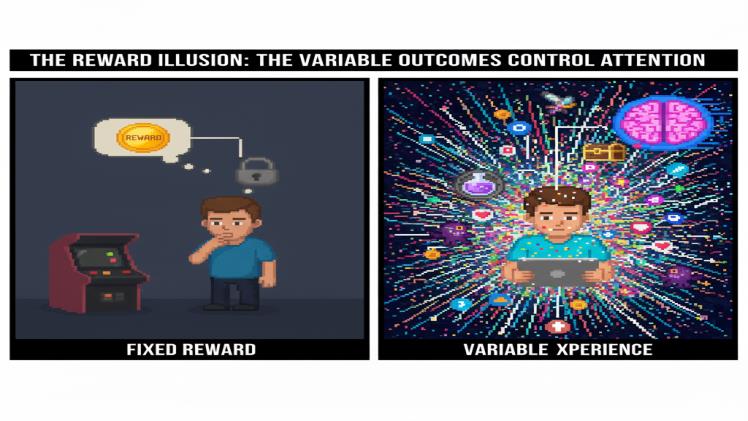
In the world of digital experiences, it is easy to think that our attention is stolen all the time. One minute, you are on a news feed, and the next, you are desperately glancing at notifications —or taking a spin on a casino mobile version, just wanting to see what will happen. What is occurring behind the scenes is not magic; it is a well-documented psychological process referred to as the Illusion of rewards.
Fundamentally, this is what the brain of a human being does when reacting to unpredictable results, unforeseen, uncontrollable instances of satisfaction that make us keep going back to them. Although everyone who has visited sites such as National Casino Greece will clearly see this in the context of games and rewards, the engine has much more to do with gambling, influencing online habits across apps, social media, and even everyday decision-making.
1.What Is the Reward Illusion?
The Illusion of rewards is very misleading: we over-value unpredictable rewards. Contrary to predictable, assured rewards, variable rewards create a sense of anticipation that captures interest. Imagine it were a version of a slot machine of the mind: the brain becomes overly concentrated on the probability of the good.
Key behavioural patterns:
- The repetitive checking of applications or notifications.
- Wasting more time on activities that are periodically rewarded.
- Experiencing a wave of excitement upon the unexpected.
Our brains are programmed to seek immediate satisfaction, even without any financial interests. That is why online gaming websites or the mobile edition of a favorite casino may be hypnotic.
2. The Response of the Brain to a Variable Reward.
Variable outcomes not only capture our attention but also physically influence our brain activity. This effect is based on the brain’s dopamine loop. Dopamine is not just a pleasure chemical, but the indication that something significant is occurring and is worth attention.
| Brain Mechanism | Role in Reward Illusion | Example in Digital Behavior |
| Striatum | Processes reward signals | Noticing a surprise bonus on National Casino Greece |
| Prefrontal Cortex | Decision-making and focus | Choosing to play again on a casino mobile version |
| Dopamine | Motivates behavior | Feeling excitement from an unpredictable reward |
In the face of an unpredictable outcome, the errors in predicting rewards trigger a peak in dopamine, which consolidates our attention and stimulates recurrence. This is why individuals can spend hours, even when they should not, on games, apps, or websites that offer intermittent rewards.
There is also the issue of decision fatigue. Since rewards are constantly anticipated, they can overwork the prefrontal cortex, making users more likely to fall into habitual loops than to make rational choices. The anticipation, unpredictability, and cognitive load are a near-perfect mix to enable engagement.
3. Reward Illusion in the Digital Environment.
Although variable rewards have been analyzed first in the context of gambling, their effects are present in the digital world. Mobile applications, social story sites, and gaming platforms are all leveraging this tenet to drive attention and retention.
3.1 Casino Environments
Sites such as National Casino Greece are the best illustration of the strength of variable outcomes. Even informal communication, such as spins, bonus rounds, or lucky wins, is also planned to be unpredictable. This randomness reinforces behavioural patterns and helps users return to the site, subconsciously monitoring when they have another opportunity to earn a reward.
3.2 Mobile Experiences
The casino mobile version increases the impact. Mobile notifications, alerts, and micro-rewards enable users to interact anytime, anywhere, which increases the frequency of dopamine loops. Each push notification becomes a prompt of sufficient strength, a reminder to the brain that another reward is just a single tap away.
3.3 Extended Digital Applications.
Variable rewards are not limited to gambling. The same is used in social media likes, app accomplishments, or in surprise discounts. There are cycles of digital engagement in which the user feels stuck, rechecking to see when positive feedback will come. Even a routine event, such as a notification, can become an object of involuntary attention.
4. Professional Evaluation and observations.
Both behavioural economists and psychologists concur that variable rewards are among the most effective techniques for attracting attention and reinforcing the habit loop. According to cognitive-behavioural specialist Helena Markos, humankind is programmed to overestimate uncertainty. The greater the uncertainty of a reward, the greater the hijacking of attention it achieves–good or bad.
Experts also point out ethical considerations. Gaming websites such as National Casino Greece and social applications should strike a balance between engagement and potential cognitive biases and addictive behaviour. Being aware of the dopamine loop and decision fatigue that generate the Illusion of rewards will enable users to operate within digital environments more intimately and to recognize when it is being controlled by engineered unpredictability rather than actual choice.
Variable rewards influence behaviour in subtle yet far-reaching ways. Are you playing a mobile casino version, scrolling through a feed, or wondering whether you will get a surprise bonus? The Illusion of rewards is why our brains cannot resist the unpredictable —and why games like National Casino Greece are so tempting without having to scream to draw attention.